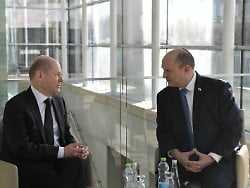Israeli on Ukraine mission
Bennett travels to Scholz after the Putin meeting
03/05/2022 8:29 p.m
In his efforts to mediate in the Ukraine war, Israeli Prime Minister Bennett first traveled to Moscow to see Putin and then, just as surprisingly, to Berlin. Chancellor Scholz will also be included in the mediation mission.
After a surprise visit to Moscow, Israeli Prime Minister Naftali Bennett is in Berlin to discuss the Ukraine conflict with Chancellor Olaf Scholz. This was reported from German government circles. The meeting was also confirmed by the Bennett office in Israel. Scholz had only visited Jerusalem three days ago.
Bennett came to the Russian capital today and spoke to Kremlin chief Vladimir Putin about the Ukraine war. The Israeli head of government is on a short working visit to Moscow, the Kremlin said. “The situation around Ukraine is being discussed.”
Government circles in Jerusalem said the conversation lasted three hours. Bennett has coordinated with the US, Germany and France and is “in constant communication with Ukraine”. He also spoke to Putin about the situation of the Israelis and the Jewish communities in view of the conflict. According to information from Jerusalem, after the meeting with Putin, Bennett also called Ukrainian President Volodymyr Zelenskyy. Israel is being discussed as a mediator in the Ukraine war. According to media reports, a few days ago Selenskyj asked Bennett to organize negotiations between Russia and Ukraine in Israel.
According to Bennett’s office, the meeting with Putin was attended by Israeli Housing Minister Seev Elkin, who helped with the translation. Elkin comes from the Ukrainian city of Kharkiv and is considered a Putin expert. He had also always attended meetings between Bennett’s predecessor, Benjamin Netanyahu, and Putin. Israel has good relations with both countries, but also finds itself in a conflict. It does not want to upset its main ally, the United States, but at the same time depends on Moscow’s goodwill for strategic reasons, including in the conflicts with Syria and Iran.
